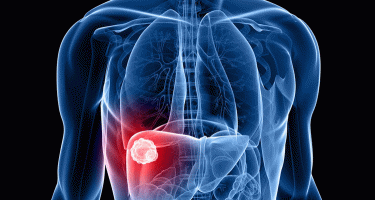
There are still no established biomarkers to predict the success of immunotherapy in patients with liver cancer.
In a multicentre study led by Matthias Pinter from the Division of Gastroenterology and Hepatology of the Medical University of Vienna, a score based on simple laboratory parameters has now been developed to predict outcome in liver cancer patients receiving immunotherapy.
The results were published in the prestigious Journal of Hepatology.
With the aim of providing personalised medicine (also known as precision medicine), the Liver Cancer (HCC) Study Group Vienna, headed by Matthias Pinter at the Division of Gastroenterology and Hepatology of the Department of Medicine III at MedUni Vienna and Vienna General Hospital, is primarily concerned with identifying groups of patients who might respond particularly well to certain forms of treatment.
The recent large-scale retrospective international study developed a score based on the two routine laboratory parameters alpha-fetoprotein (AFP; tumour marker) and C-reactive protein (CRP; inflammatory marker) that correlated with outcome in liver cancer patients treated with immunotherapy.
"If both parameters were elevated above a certain level, patients had significantly shorter survival and a lower probability of achieving radiological disease control with immunotherapy," said first author Bernhard Scheiner, "Both parameters, AFP and CRP, may influence the tumour immune milieu to favour tumour growth and potentially render immunotherapy less effective."
The results were validated in an independent cohort.
A total of 14 European centres participated in this study.
"Because the score is based on simple laboratory parameters, it is objective and widely available. In future, the score could help in the selection of patients for clinical trials and support decision-making in clinical practice," says Matthias Pinter.
Hepatocellular carcinoma (HCC) is the most common primary liver cancer and is predominantly found in people with chronic liver disease.
In most cases, HCC is not diagnosed until it has reached an advanced stage, where surgical or loco-ablative procedures are no longer possible, and systemic drug therapies are primarily used.
Recently, the first immunotherapy-based regimen was established for HCC, representing the new standard of care in drug treatment for the vast majority of patients with advanced HCC.
It is not yet clear which HCC patients benefit the most from immunotherapy.
Source: Medical University of Vienna
We are an independent charity and are not backed by a large company or society. We raise every penny ourselves to improve the standards of cancer care through education. You can help us continue our work to address inequalities in cancer care by making a donation.
Any donation, however small, contributes directly towards the costs of creating and sharing free oncology education.
Together we can get better outcomes for patients by tackling global inequalities in access to the results of cancer research.
Thank you for your support.